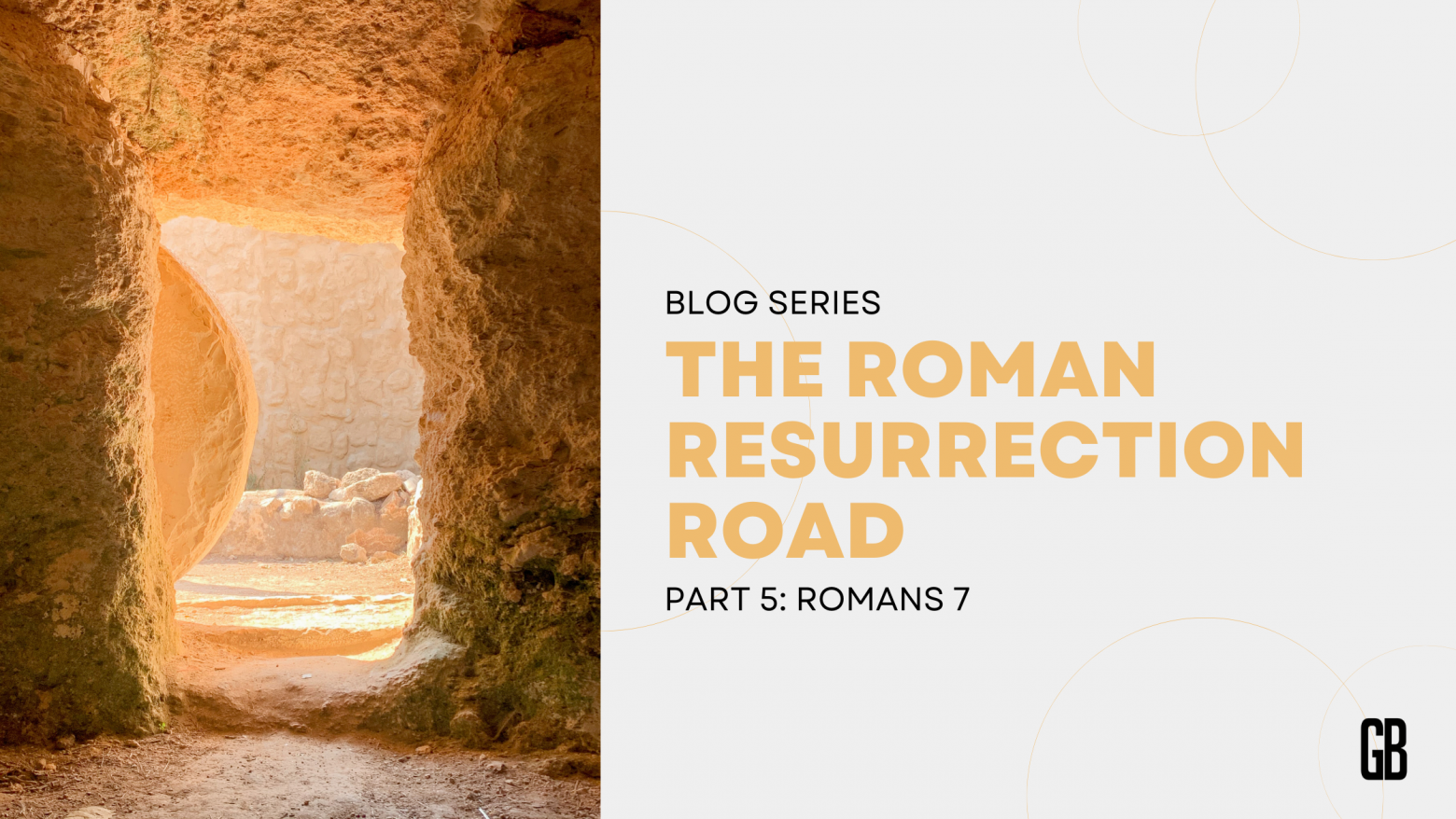This blog is part of a series of blogs concerning the Resurrection realities found in the book of Romans. To read the intro to this series, go here.
If you’re following this series on the Roman resurrection road, you’ll know that we spent a significant amount of time on identification on last week’s stop. We identify with the Risen Christ, because we identified with Him (and He with us) in His death.
This uniting with Him in identification in Romans 6 showed us the reality that we are dead to sin, but alive to God because of the resurrection.
For the next stop on the road, we hit Romans 7:4-6, where a similar, but different reality is revealed to us: our uniting in identification with Christ’s death means we are dead to the Law, but we are raised to life to bear fruit!
“4 Therefore, my brethren, you also were made to die to the Law through the body of Christ, so that you might be joined to another, to Him who was raised from the dead, in order that we might bear fruit for God. 5 For while we were in the flesh, the sinful passions, which were aroused by the Law, were at work in [a]the members of our body to bear fruit for death. 6 But now we have been released from the Law, having died to that by which we were bound, so that we serve in newness of the [b]Spirit and not in oldness of the letter.”
Romans 7:4-6
In order to be raised, there must be a death. Here we learn clearly that God made us to die to the Law through Christ’s death. Does this mean that the Law is bad?
No, by all means, the Law is holy, just, and good. It just lacks any sort of ability to make any person holy, just, and good.
On top of that, “sinful passions” are actually “aroused by the law,” according to verse 5.
This does not mean that the Law itself is sinful or meant to make you sin. The problem is that sin actually “takes opportunity through the Law,” (V.8) producing the very things the Law prohibits in you. In other words, the problem is not with the Law; the problem is our sin nature before identifying with Christ’s death. The Law isn’t broken; WE are. The fallen sin nature looks at the law of God, such as do not covet, and desires it all the more.
While the Law remains God’s holy standard, God knows that the Law written on two pieces of stone will never be a viable avenue for righteousness.
That’s why one of the main promises of the New Covenant is that God takes His Law and writes it on our hearts, moving the motivation from the outside to within. The Law cannot make you holy, just, and good, in fact, it reveals the opposite to us. It is the X-ray machine that shows you the broken arm, not the cast that sets the bone in order. Since the Law cannot make you holy, just, and good, God made you to die to the Law through the Body of Christ.
You died to the Law as an avenue for righteousness, as a means of bearing fruit for God.
The only fruit you bear with the Law is “fruit for death” according to verse 5. But just as I noted last week, if we have been united with Him in the likeness of His death, surely we shall also be united with Him in the likeness of His resurrection (Romans 6).
We died with Christ, but we are raised with Christ. In relation to the Law, what does that mean? We have been released from the law as something we try to keep religiously in hopes of bearing fruit acceptable to God. All those efforts result in the arousal of sin and death fruit. Instead, we are united, joined, with the resurrected Christ, serving in the newness of the Spirit in order to bear fruit for righteousness!
Hear me clearly, you were not released from the Law to embrace lawlessness; quite the opposite. You were released from the law to be joined to another, Jesus Christ!
I’ve encountered people over my lifetime who have become so enamored with the idea that they are free from the Law that they never learned to embrace joining to Christ. Many inevitably ended up in error, hyper-grace, universalist, or Marcionistic mentalities, embracing fallacies about the God we love. The focus is not on the freeing, though it is helpful, the focus is on the joining.
I once knew a couple who got together after nasty splits with their exes. Unfortunately, many times their conversations devolved into their divorces, feasting on their frustrations with their old partners. It takes no rocket scientist to see that this isn’t a good formula for enjoying a new marriage. Focusing on the separation makes you bitter. Just as we were “married,” united to the Law (7:1-3), the death of one party freed us from that husband. When there is a new marriage, there is a change in identity.
An inordinate focus on being free from the Law without emphasizing what the freedom was meant to accomplish will inevitably end up in error.
It will embitter you towards a holy, just, and good Law, because you will naturally take it out of context. This is more dangerous than I can even begin to explain here.
Beloved people, you were freed from the Law in order that you may be joined to the Risen Christ! This is the real treasure! You are joined to the one who IS the resurrection and the life, and you can actually bear fruit for God! You only produced death fruit, no matter how hard you tried before in your own righteousness. It was, at best, filthy rags. But now, gloriously, by serving God according to the Spirit, joined with the Resurrected Christ, you bear the fruit of righteousness!
If you’re bearing the wrong fruit, you might be trying to bear it through the wrong avenue. Obedience still matters, but now your obedience is a fruit of right relationship to the One who is our life. Obedience is a fruit, not a root!
The death made it possible for us to be freed from the Law, but the resurrection made it possible for us to bear righteous fruit, with His Law written on my heart!
The Law moves from my “have to” to naturally wanting to because I live to please the One who joined me to Himself. We truly make it our aim to “be pleasing to Him,” not in law-keeping, but in humble, relational submission, identification, and unification with the resurrected Christ.
The resurrection gives us the promise, and expectation of, the fruit of righteousness. You can be fruitful because He is Risen!

I am a Pastor, Author, and Teacher based out of Kansas City, MO. I am passionate about the message of the Kingdom, Grace, Healing and the renewing of the mind. I have been following God since age 18 when I was radically transformed and inserted into revival. I have learned some hard lessons and seen some wonderful fruit in the Kingdom, and my goal is to impart wisdom and grace to you to walk in fullness. I have a walking miracle for a wife and three amazing boys.

